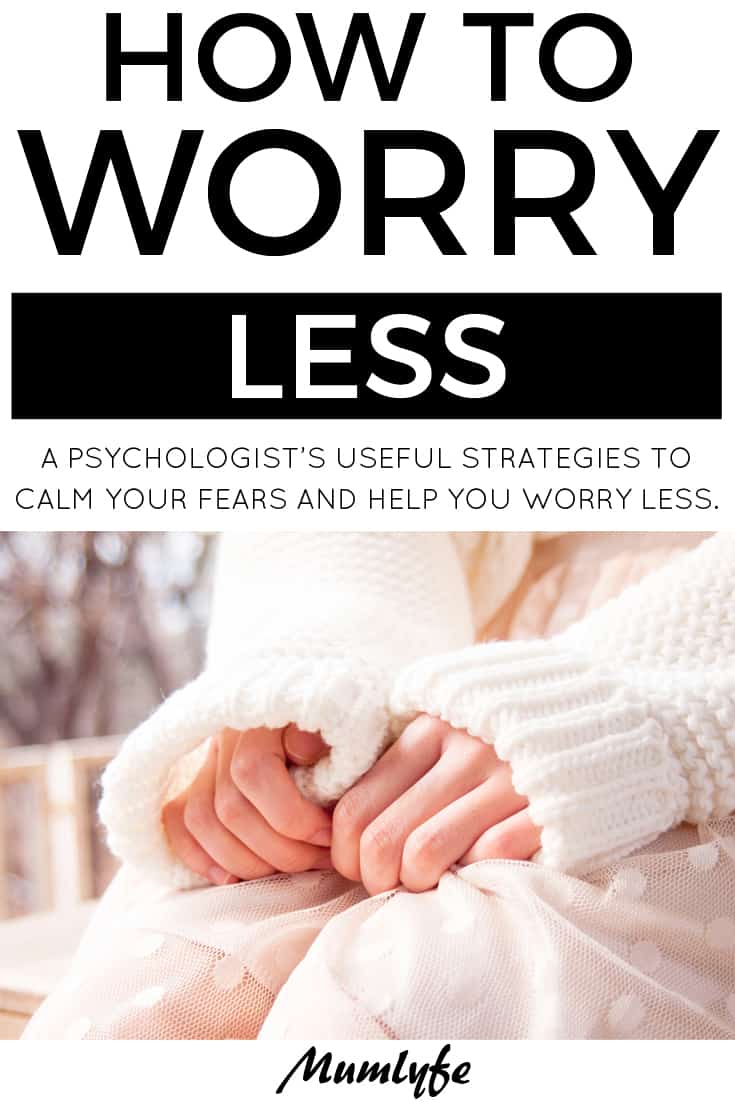Many mothers feel they worry too much and want to worry less. Worry is actually a natural response to thinking about the future and anticipating events. So it’s natural to worry about the way we are parenting our kids, their future, our future, and whether we are doing the right thing. But it also makes sense to want to worry less if we can.
Some of us are wired up to worry more than others, but most of us have manageable worries. When we worry excessively and uncontrollably we’re heading into anxiety territory and that needs professional support.
Fortunately, most of us have manageable worries and though it can feel exhausting, worry is not always a bad thing. In fact, it’s often useful. We need to worry about the implications of not strapping our kids into their car seats. We should worry enough about our safety to look before we cross the road. A degree of worry keeps us safe. It prompts us to take action.
But what about the crazy, needless worry?
Every once in a while I catch myself worrying about whether my kids will survive adolescence. Or that I will develop a debilitating illness. Or that the house will be burgled while we’re away on holiday.
These are things I can’t control – but I worry about them anyway. It serves no purpose, other than to make me miserable.
I know I’m not alone in this. We are all susceptible to an overactive imagination, especially when we wake in the early hours of the morning or when life feels especially out of our control. It would be so freeing to worry less in these moments.
More from Ellen:
• How to help your kids develop a growth mindset
• 3 important things thriving families do
• 12 apps that will give you a happiness boost
Why do we waste time with these worries?
Blame your brain.
A common cognitive bias is the ‘neglect of probability bias’. It’s the tendency to disregard the likelihood of an event taking place when a situation is uncertain.
I don’t know what the future looks like for my kids, so my brain jumps to the worst case scenario. They could die in a car crash! They might get cancer. They could live a life of misery and heartache.
My brain neglects the probable outcome – that they’ll go on to live long, happy, functional lives – in favour of more distressing and dramatic outcomes.
Why does the brain do this? Your brain likes short cuts, so it jumps to the easiest outcome to factor. It’s easier to imagine a worst-case event and how we’d feel if it happened. Removing emotion and calculating likelihood takes mental effort.
We feel before we think. That’s human.
The more serious the threat and the more emotional the topic, the less reassuring logic and reasoning seems to us. Don’t give me statistics when I’m watching footage of a terrorist attack. I’m thinking of every person I know who might be nearby and worrying about their safety.
When our brains perceive risk, our emotions are not easily convinced otherwise.
How to worry less
Our neglect of probability bias and jumping to drama over logic is part of being human. It’s normal. It’s not a problem – unless it is. If you find yourself overwhelmed by worry about the future and events you can’t control here are some tips to worry less.
Pay attention
Worry can be so habitual that we don’t notice when we’re doing it. Our feelings can give us insight into our thoughts. If you’re feeling stressed and anxious, pay attention to your thoughts. What are you thinking about? Is it an event you can control? If yes, make some changes to put your mind at ease and worry less about these events next time. If not, distract yourself with something else to help you let the thoughts go.
Don’t believe everything you think
Just because you think it, doesn’t make it real.
Life is full of uncertainty and worrying about an event won’t change the likelihood of it occurring. Give your thoughts space, but don’t believe you have to action or hold onto them. Allow thoughts to wander in, then wander back out again.
Lean into uncertainty
When we lean into uncertainty we free ourselves to live life more fully. Learn to sit with being unable to predict life’s outcomes and you will feel much more at ease when dealing with the everyday. And hopefully worry less about the future.
Plan and act
If you find yourself worrying about events you can control, having a plan of action can help you worry less. When we know we have given something our full attention and done the necessary work, we tend to worry less about the outcomes. In other words, focus on changing the things you can change in order to plan for the things you can’t.
Stay in the moment and choose gratitude
Focus on the here to free yourself from fear.
When you catch yourself worrying about something you can’t control, shake it off, take a deep breath, open your eyes and your heart to the beauty around you. Appreciate the sun, the sky, nature, your loved ones and the fact that everything is okay in this moment, right now.
What do you most worry about and how could you worry less about it?
Image by Boram Kim




What raising a kid with anxiety taught me about parenting | Mumlyfe
Tuesday 4th of June 2019
[…] Try this: Some strategies to help you worry less […]
3 things learning to surrender has taught me | Mumlyfe
Friday 28th of December 2018
[…] this nagging worry is something I usually carry around in my head and heart like a beacon. I think I truly believed […]